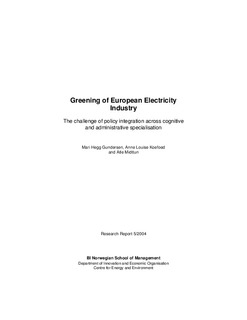| dc.description.abstract | Focusing on greening of electricity industry (GEI), this report explores the positions and outlook of various units within the EU system with mandates in the greening of electricity industry process. The study takes a knowledge-based perspective on administrative decision-making, where administrative units are seen as carriers of cognitive models and as specialized competency networks.
Embedded in the EU’s administrative management of GEI, the study finds positions that can be referred to as four underlying conceptual models:
1) The market efficiency model, which is typically found in units handling internal market policy, competition policy and de-regulation policy of the EU. The core focus of this model is on efficient allocation of economic resources between alternative deployments in an economy where both economic resources and technologies are given and scarce.
2) The innovation/exploration model, which relates to the innovation policy dimension of GEI. Environmental reorientation of the energy system is here seen as a question not only of efficiency, but also of technological change. The core focus of this model is new industrial development and growth as a function of innovation.
3) The eco-efficiency model, which relates specifically to the environmental policy dimension of GEI. The greening challenge is here transformed into economic incentives. The core focus of this model is on internalisation of costs of environmental damage and negative external effects into the business model and into the regulatory market design.
4) As a major input factor in the economy GEI also raises important industrial policy concerns. The core focus of the industrial policy model is on building up and maintaining industrial capabilities within the territorial domain in focus, in this case the EU.
The final part of the report develops an outlook on future European GEI policy, drawing on each of the perspectives and relating the policy alternatives also to the interests of the European Parliament and member countries. It is argued that the market efficiency model, with its eco-efficiency extension, is hard to defend politically when seen from the perspective of the EU Parliament or when related to the distributive interests of member countries.
In comparison, the innovation/exploration approach has many strong sides as far as EU policy-making is concerned. With a niche market strategy, and/or project based financing, the innovation perspective creates the possibility for partnerships rather than confrontation with existing member state and industrial interests. The flexible tools in the innovation approach also allow for tradeoffs between different fractions in Parliamentary decision-making. A disputed weakness of the innovation model, if applied as a dominant strategy for greening of electricity, however, is its debateable efficiency and high costs.
The outlook on greening of electricity industry coming out of the industrial policy model is ambiguous in so far as this model can be applied at different levels - from the individual nation state to the EU level. With a dominant focus on low input energy prices as part of a European industrial competitiveness strategy, this model has a credibility problem as far as GEI is concerned.
While in a static perspective the policy outlooks derived from the different cognitive frameworks may conflict, a dynamic perspective could show them to be more complementary.
As a final point, the report notes that irrespective of the production side solution to GEI in Europe, European energy policy is conspicuously under-developed when it comes to initiatives to reduce energy consumption. | en |
